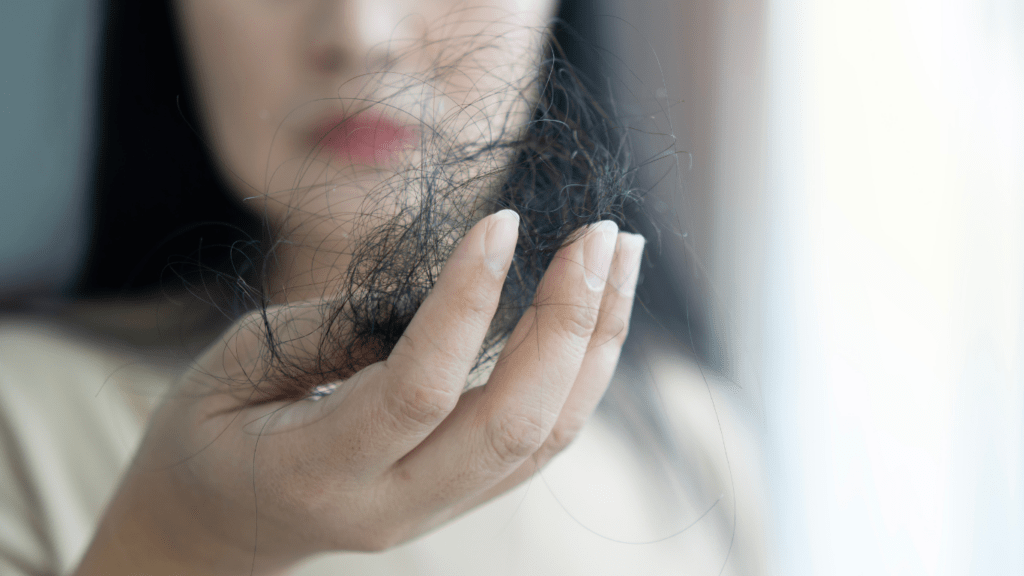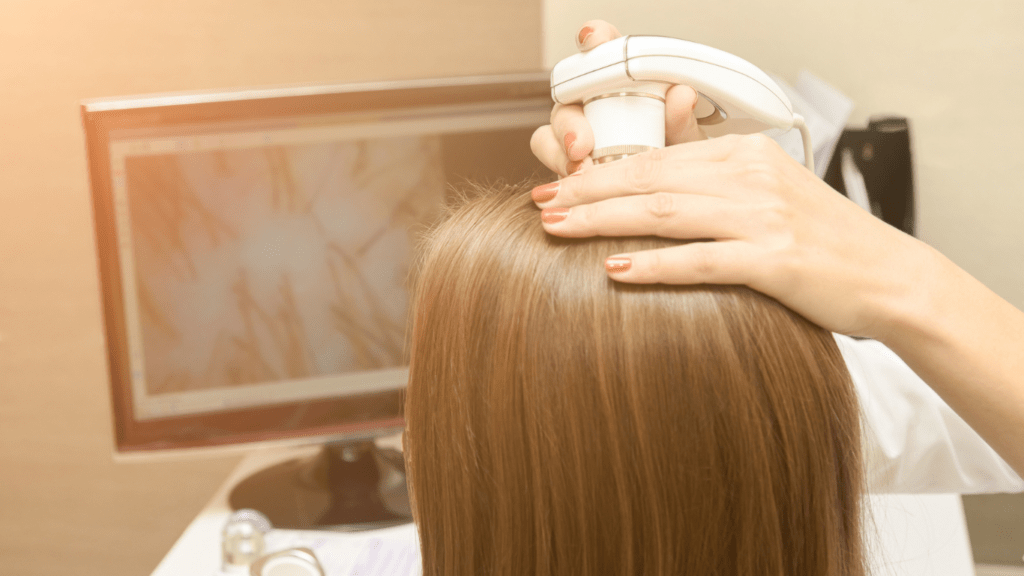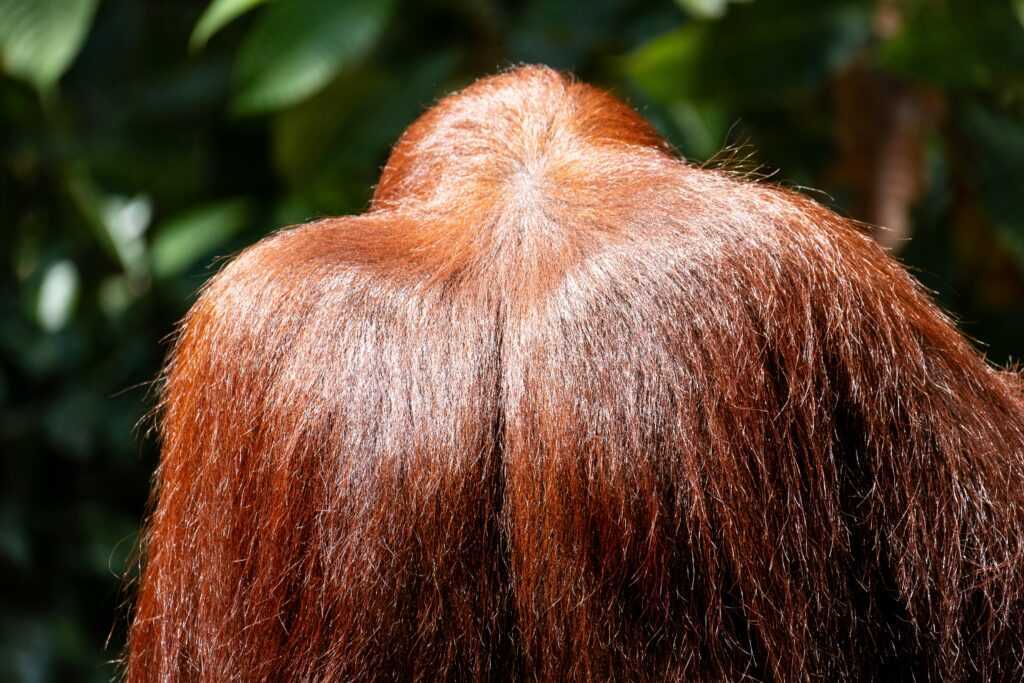Understanding Hormones and Hair Health
Hormones play a pivotal role in hair health. They regulate growth cycles, hair density, and even color.
The Role of Hormones in Hair Growth
Hormones significantly influence hair growth phases. Androgens, like testosterone, can shorten the growth phase (anagen) if levels are high. Estrogen, however, tends to prolong the anagen phase, resulting in thicker hair. Thyroid hormones also affect hair health by regulating metabolism, impacting the energy needed for hair growth.
Common Hormonal Imbalances Affecting Hair Health
Several hormonal imbalances can affect hair health. Polycystic ovary syndrome (PCOS) often elevates androgen levels, leading to thinning hair or hirsutism in women. Hypothyroidism can slow metabolic processes, resulting in brittle or thinning hair. Menopause decreases estrogen levels, causing hair to become finer. Each condition’s impact varies depending on individual hormonal profiles.
Key Hormones That Affect Hair Health
Hormones play pivotal roles in determining hair health. Key hormones like androgens, estrogens, thyroid hormones, and cortisol have distinct effects on hair growth, density, and texture.
Androgens
Androgens, including testosterone and dihydrotestosterone (DHT), influence hair growth significantly. DHT, a potent androgen, binds to hair follicles, leading to their miniaturization in scalp regions prone to baldness. This results in shorter, thinner hair strands. Androgens also affect sebaceous glands, increasing oil production and potentially causing scalp conditions that hinder growth.
Estrogens
Estrogens support prolonged growth phases, leading to thicker, healthier hair. High estrogen levels, as seen during pregnancy, enhance hair density and reduce shedding. Conversely, decreased estrogen levels during menopause may trigger increased hair loss and thinning. Estrogens help counteract the follicle-shrinking effects of androgens, promoting a balanced hair growth cycle.
Thyroid Hormones
Thyroid hormones, predominantly thyroxine (T4) and triiodothyronine (T3), regulate metabolism and significantly impact hair health. Hypothyroidism (low thyroid hormone levels) can result in hair thinning, increased shedding, and changes in hair texture, making it dry and brittle. Hyperthyroidism (excess thyroid hormones) might also trigger scalp hair thinning but can increase body hair growth.
Cortisol
Cortisol, the primary stress hormone, disrupts normal hair growth cycles when elevated for extended periods. High cortisol levels move hair from the growth phase to the shedding phase prematurely, leading to diffuse thinning and increased hair fall. Stress-induced cortisol spikes can exacerbate conditions like telogen effluvium, where a large number of hairs enter the shedding phase simultaneously.
Symptoms of Hormonal Imbalances on Hair
Hormonal imbalances can affect hair in various ways. They can manifest through hair loss, changes in texture, and even excessive growth.
Hair Loss
Hair loss often results from hormonal imbalances, particularly with androgens. Elevated androgens, like testosterone, increase DHT levels and trigger hair follicle miniaturization. This causes thinning and eventual hair loss. Conditions like polycystic ovary syndrome (PCOS) in women highlight this imbalance. Lower estrogen levels, often during menopause, also correlate with increased hair shedding.
Changes in Hair Texture
Hormonal shifts can alter hair texture. Hypothyroidism, where the thyroid gland produces insufficient hormones, results in brittle, coarse hair. Conversely, hyperthyroidism causes softer, finer hair. Elevated cortisol, often due to stress, disrupts the hair growth cycle, leading to inconsistency in hair texture. Pregnancy, a period of fluctuating hormone levels, sometimes results in noticeable changes in hair texture.
Excessive Hair Growth
Excessive hair growth, known as hirsutism, usually links to higher androgen levels. Women with PCOS often experience hirsutism, displaying hair growth on typically male-associated areas like the face and chest. Cushing’s syndrome, where cortisol levels are excessively high, can also lead to unwanted hair growth. Balancing these hormone levels typically reduces excessive hair growth.
Diagnosing Hormonal Hair Issues

Identifying hormonal hair problems requires a systematic approach. Understanding the root cause enables effective treatment.
Medical Tests
Doctors recommend specific tests to pinpoint hormonal imbalances. Blood tests, such as Serum Testosterone and DHT levels, measure androgen parameters. Estrogen and Progesterone tests help assess female hormone levels, which affect hair density and texture. Thyroid Function Tests (TFTs) diagnose conditions like hypothyroidism or hyperthyroidism, leading to changes in hair quality. Cortisol levels are assessed to determine stress-related hormone effects, often causing hair thinning.
| Test Name | Purpose |
|---|---|
| Serum Testosterone | Measures androgen levels |
| Estrogen and Progesterone | Assesses female hormone levels |
| Thyroid Function Tests (TFTs) | Diagnoses thyroid-related hair issues |
| Cortisol Levels | Determines stress-related hormone effects |
Consultation with Specialists
Experts play a crucial role in diagnosing and treating hormonal hair issues. Endocrinologists specialize in hormone-related conditions and provide targeted treatment plans.
Dermatologists focus on hair and scalp health, identifying symptoms like hair thinning or texture changes. Trichologists are hair and scalp experts who offer specific therapies for hair preservation and regrowth. Collaboration among these specialists often yields the best outcomes, ensuring a comprehensive approach to managing hormonal hair issues.
For accurate diagnosis and effective treatment, a coordinated effort between you and your healthcare team is essential.
Treatments for Hormonal Hair Issues
Treatments for hormonal hair issues target the underlying hormonal imbalances that affect hair health. Several methodologies exist to address these concerns, including medications, lifestyle changes, and alternative therapies.
Medications
Medications form a primary approach to treating hormonal hair issues. Anti-androgens like spironolactone block androgen receptors, reducing hair loss in women. Finasteride, effective for men, inhibits 5-alpha-reductase, an enzyme converting testosterone to dihydrotestosterone (DHT).
This action helps lower DHT levels, promoting hair regrowth. Hormonal therapies, such as oral contraceptives, regulate estrogen and progesterone levels, benefiting women with androgenic alopecia. Specialists may also prescribe minoxidil, a topical treatment, to enhance hair growth and thickness. Always consult healthcare professionals before starting any medication.
Lifestyle Changes
- Lifestyle changes greatly influence hormonal balance and, consequently, hair health.
- Nutrient-rich diets, with adequate vitamins (e.g., biotin, vitamin D) and minerals (e.g., zinc, iron), support hair growth.
- Regular exercise improves circulation, enhancing nutrient delivery to hair follicles.
- Stress reduction techniques, including mindfulness and yoga, lower cortisol levels, mitigating its adverse effects on hair.
- Getting sufficient sleep also regulates hormonal cycles, promoting a healthier scalp environment. Adopting these habits not only aids hair health but overall well-being.
Alternative Therapies
Alternative therapies provide complementary options for managing hormonal hair issues. Acupuncture, targeting specific points, can improve blood flow to the scalp and balance hormones. Herbal supplements like saw palmetto and ginseng, known for their potential to reduce androgen levels, offer natural support.
Essential oils, such as rosemary and peppermint, stimulate hair growth when massaged into the scalp. Low-level laser therapy (LLLT) uses light energy to encourage hair growth and reduce hair loss. While these therapies may require a longer duration to show results, they provide holistic benefits, often with fewer side effects. Always seek advice from healthcare professionals before exploring alternative treatments.
Preventing Hormonal Hair Issues
Preventing hormonal hair issues involves a multifaceted approach. Addressing diet, stress, and regular check-ups can maintain hormonal balance and promote healthy hair.
Diet and Nutrition
A balanced diet supports hormonal health, which directly impacts hair. Consuming foods rich in vitamins and minerals strengthens hair follicles. Omega-3 fatty acids, found in fish and flaxseeds, support scalp health. Including leafy greens, nuts, seeds, and whole grains can also improve hair strength and growth.
Iron and zinc deficiencies, identified through blood tests, often result in hair loss. Supplementing with foods like:
- spinach
- pumpkin seeds
- lentils
helps restore these levels. Hydration is equally crucial; drinking adequate water keeps the scalp hydrated and healthy.
Stress Management
Chronic stress disrupts hormonal balance, affecting hair health. Practicing stress management techniques can mitigate this impact. Exercise releases endorphins, which can lower stress levels.
Incorporating mindfulness practices like yoga or meditation calms the mind and balances hormone levels. Ensuring adequate sleep further regulates hormone production. Stress-relief activities such as reading, hobbies, or spending time in nature also decrease stress hormone levels, supporting overall hair health.
Regular Health Check-ups
Regular health check-ups are essential for early detection of hormonal imbalances. Annual or semi-annual visits to healthcare professionals help monitor hormone levels through blood tests.
Early identification of conditions like thyroid disorders or polycystic ovary syndrome enables timely intervention. Routine consultations with endocrinologists, dermatologists, and trichologists ensure comprehensive care. Staying proactive with health assessments supports hormone regulation, promoting healthier hair growth.



 Senior Hair Health Advisor
Maria is a dedicated professional specializing in hair health and wellness. She brings a wealth of knowledge on how to maintain strong, resilient hair through natural and science-backed methods. Maria’s detailed guides and expert advice help readers enhance their hair health, offering personalized solutions to common hair concerns.
Senior Hair Health Advisor
Maria is a dedicated professional specializing in hair health and wellness. She brings a wealth of knowledge on how to maintain strong, resilient hair through natural and science-backed methods. Maria’s detailed guides and expert advice help readers enhance their hair health, offering personalized solutions to common hair concerns.
